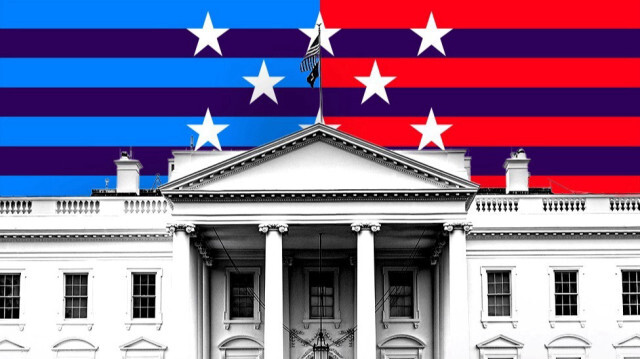
There is ‘basically no difference between the Republicans and Democrats in their attitudes towards China,' says academic Hongda Fan
Relations between China and the US are the most consequential of this century, but Beijing has no preferred winner in America's presidential race, analysts told Anadolu.
Interviews with China analysts to understand how Beijing views the Nov. 5 presidential election reveal bleak expectations among policymakers in the world's second-largest economy.
Neither of the two main parties in the US “wants to be publicly seen or associate with the Chinese government,” said Einar Tangen, a prominent Chinese commentator.
“Policies towards China will not change regardless of who is elected,” he added.
Americans will head to the polls early on Nov. 5 – in less than two weeks – to elect a successor to President Joe Biden, whose predecessor Donald Trump and Vice President Kamala Harris are currently neck-and-neck in opinion polls.
Wang Zaibang, a senior fellow at the Beijing-based Taihe Institute, told Anadolu that Republicans “are more straightforward and tough.”
“Democrats are more hypocritical and tend to say one thing and do another,” he said.
Einar said most US lawmakers “are more interested in going to Taiwan and giving shadow support to the 20% of voters who support separatism.”
Among the issues plaguing US-China ties, Taiwan has assumed increased significance over recent years.
Since the Trump era, following the Obama administration's pivot to Asia, interactions between Washington and Taipei have surged.
The US has supplied Taiwan with arms and weaponry worth billions of dollars, much to the chagrin of China, which claims the island nation of around 24 million people as a breakaway province.
Beijing has not ruled out the use of force to unite the island with the mainland sitting across the Taiwan Strait.
- US public, official perception of China ‘very negative'
Hongda Fan, a professor at Shanghai International Studies University, expressed pessimism about any thaw in the near future between the two powers.
While maintaining the Chinese position that the presidential election is “an internal affair of the United States,” he told Anadolu that “the current US perception of China is very negative, whether it is official or the public.”
There is “basically no difference between the Republicans and Democrats in their attitudes towards China,” said Hongda, who studied in the US and regularly visits American universities for academic work.
“Through my observations in the US, I found that Americans have many misunderstandings and incorrect perceptions of China, which is not conducive to US-China relations,” he said.
There “are very obvious differences in views between China and the United States on many issues. It will not be easy for the two countries to interact in the future,” Hongda added.
He agreed with Einar that Washington's China policy “in the future will not be significantly different.”
However, he noted that any Republican administration “will be tougher” towards China.
Einar backed Hongda's assessment by blaming Trump's policies for “alienating the peoples of the two countries,” despite the two sides reaching economic deals during the last Republican administration.
The former US president raised tariffs on Chinese goods, triggering a tit-for-tat trade war, complicating bilateral trade of around $575 billion, which Trump said favored Beijing.
- Beijing hopes new administration ‘stops decoupling, disconnecting links'
On the issue of the US policy toward China, Wang said that both Trump and Harris “are much the same.”
“They are two birds of a feather because viewing China as the biggest adversary has become a bipartisan consensus in the US,” he said.
“The differences lie in that the Trump administration's trade and technology wars against China left the country caught off guard, with Biden further escalating these hostilities.”
According to Einar, if elected, Trump “will impose tariffs on friend and foe alike, which could increase US inflation and decrease global demand, resulting in a global depression.”
Regarding Harris, he said the vice president “hasn't had a policy she hasn't flip-flopped on, and is expected to follow the same American exceptionalist policies of Biden that support the conflicts in Ukraine and the Middle East.”
Wang cautioned the US against “pursuing economic nationalism and trade protectionism,” terming it “a dead end.”
“The Chinese government hopes but does not expect the (next) US government to stop decoupling and disconnecting links,” he said.
Hongda built on this view by saying that Beijing “has repeatedly emphasized that China and the United States are not competitors but partners.”
“China has become more and more confident in facing the United States, which is essential for the healthy development of bilateral relations,” he argued.
- ‘Two paths to the same cliff'
Wang believes the Biden administration has been “more active than the Trump administration in implementing the Asia-Pacific strategy aimed at containing China.”
However, he said the “effectiveness” of such a policy is “limited” because “most governments in the region do not fully agree with the strategic demand of the US to contain China.”
The elite in some countries found that when they provoke China under US pressure “the loss outweighs the gain,” he added.
Einar reckoned that both parties in the US “believe in the same end, that is American hegemony, and just approach it differently.”
“Trump … believes it's about the ‘art of deal.' Biden believes America can do no wrong, as long as it pursues its own hegemonic agenda.”
For China, he emphasized, the outcome of the US presidential election is a case of “two paths to the same cliff.”

